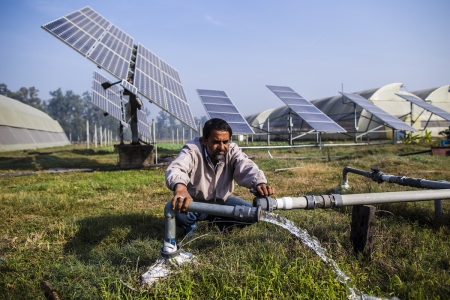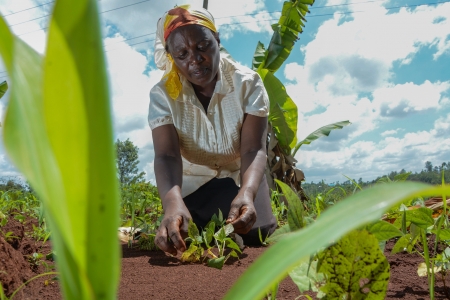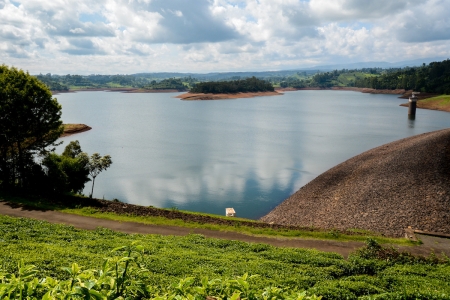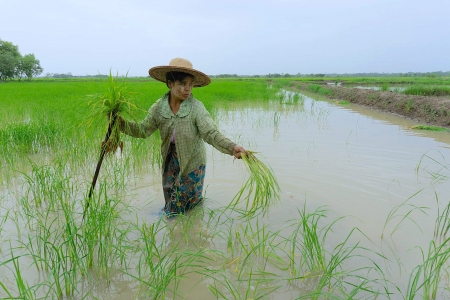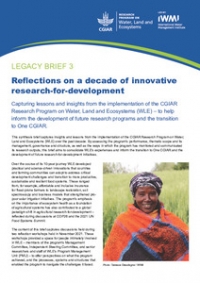How can the resilience of society be strengthened through inter-sectoral cooperation? How can transboundary cooperation help us adapt, reduce conflicts and build back better? These were some of the issues discussed in the seminar on Breaking Silos at the World Water Week 2021, which virtually brought together participants from around the world.
The Still Breaking Silos: Climate action and water across sectors and boundaries was a three-session event organized by SIWI's Scientific Programme Committee, UNECE, IWMI, and CIWA/the World Bank during World Water Week 2021. It was one of nine seminars organized by the Scientific Programme Committee and follow-up to the "Breaking Silos" webinar organized in 2020 during the World Water Week at Home event.
The first session of Still Breaking Silos sets the scene by highlighting that, to break silos, we need to improve communication about challenges and crises within and across the water community by showcasing tangible examples that can then be reflected in long-term strategies. Experiences from Central Africa to the Caribbean showed the necessity to strengthen the capacity of key players on the need to better understand and share data and that water and climate are the same priority as health and unemployment.
An audience member asked if 'breaking the silos' is mainly a question of better managing different systems, collaborating across sectors etc. or if it does also need new science. All panelists replied that both are necessary - it is not the one or the other. There are still many knowledge gaps, for instance, the understanding of community-based water resource rights in the tenure context and the inter-dependencies of different sectors.
Another participant asked if 'breaking silos' is more practical through community engagement or rather a top-down approach having an established mechanism of engagement. The panelists once again agreed that both approaches are necessary. Breaking silos requires community-engagement for perennial results, but also integration of sectoral legislations, allowing space for the catalyzing role of youth.
The key message from the session was that the Covid-19 pandemic has brought science more to the interest of the general public and the center of policy making, and this has to continue in fighting and coping with climate change where water plays a central role.
The second session was highly interactive and highlighted the increasing understanding that water can break silos and connect sectors and systems (food systems, energy, ecosystems, urban development, etc.). Moving from a water-centric view to a multi-centric approach across scales is required, and the community has to shift from publishing theoretical frameworks to implementation and practical guidance based on local knowledge. As a society, we cannot build resilience by oppressing people, and we do need a just energy transition to mitigate climate change.
The last session focused on how transboundary cooperation can help to adapt and build back better. It called for integration of climate change within river basin management planning and the use of ecosystem-based adaptation as a cost-effective alternative to grey infrastructure. Finally, it concluded that the design of new transboundary agreements must be flexible and ensure stakeholder participation in all steps of the development and implementation of a cross-border cooperative mechanism.
The youth perspective was cross-cutting through all sessions and sent the strong message that the youth is eager to make a change beyond using social media. Governments, private companies, international organizations, NGOs etc. should embrace risks, dare to give opportunities to youth and young professionals and promote youth empowerment by facilitating capacity building, fair internships, and entry-level employment opportunities. Young people are not only our future but also our present.
Watch the three-part seminar recordings on YouTube:
- Still breaking silos. Across sectors and boundaries (1/3): https://youtu.be/JIQFRYcnE1w
- Still breaking silos. Across sectors and boundaries (2/3): https://youtu.be/h1-NTEd1A-0
- Still breaking silos. Across sectors and boundaries (3/3): https://youtu.be/HRXo-8Idcww
---
Thrive blog is a space for independent thought and aims to stimulate discussion among sustainable agriculture researchers and the public. Blogs are facilitated by the CGIAR Research Program on Water, Land and Ecosystems (WLE) but reflect the opinions and information of the authors only and not necessarily those of WLE and its donors or partners.
WLE and partners are supported by CGIAR Trust Fund Contributors, including: ACIAR, DGIS, FCDO, SDC, Sida and others.



/index.jpg?itok=EzuBHOXY&c=feafd7f5ab7d60c363652d23929d0aee)


